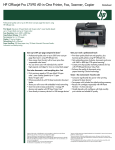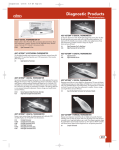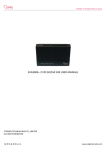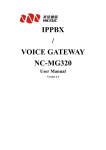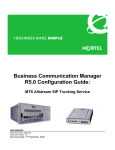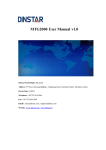Download Avaya 1140E IP Deskphone
Transcript
avaya.com Avaya 1120E IP Deskphone Intermediate-level IP Deskphone brings innovative productivity enhancing capability and flexibility to desktop communications. The award-winning Avaya 1120E IP Deskphone with Gigabit Ethernet unveils an exciting array of innovative communication features and capabilities, ideally suited for office workers and administrative personnel. The four-line Avaya 1120E IP Deskphone supports standards-based Session Initiation Protocol (SIP), delivering choice to customers in deployment options with support on either Avaya or third-party Communication Servers. The 1120E IP Deskphone also enables the presentation of converged voice and data applications, leveraging its integrated highresolution graphical, eight-level grayscale display. Navigation of applications is very flexible, with support of standard USB mice and keyboards powered from the phone’s integrated USB port. With robust and tightly linked communications features from Avaya Communication Servers, the Avaya 1120E IP Deskphone positions customers to meet both today’s and tomorrow’s communications needs. Key Features and Benefits • Multi-line IP Deskphone supports four line/programmable feature keys, 14 fixed keys, and four context-sensitive soft keys • High-resolution, backlit, graphical, eightlevel grayscale, pixel-based display, combined with a flexible five-position adjustable footstand placement, optimizes viewing in varied lighting conditions • Advanced collaborative communications support with graphical presence notification and secure instant messaging (SIP firmware only)1 • Four-way navigation cluster with “Enter” key provides easy navigation when using features • Integrated USB port powers standard USB mice and keyboards, providing input and navigation options for application interaction and simpler menu selection • Integrated IEEE 10/100/1000 Base-T Ethernet switch with LAN and PC ports reduces costs, enabling a single cable drop to support both the phone and a collocated PC • Supports Gigabit Ethernet, positioning the phone’s internal switch to accommodate growing multimedia intensive, PC-based applications, thus aligning with investment made at the wiring closet FACT SHEET Avaya 1120E IP Deskphone • Supports 802.3af standard-based PoE or local AC power via a global power supply • Secured communications with standardsbased signaling encryption, media encryption and user-based authentication for network access control • Supports Unicode for expanded language and complex font presentation on the IP Deskphone display2 • Supports Proactive Voice Quality Management (PVQM) for enhanced administration and diagnostics3 • Lockable Tools Menu offers local access to configuration, diagnostic and user preference options • Supports converged (voice and data) applications via External Application Server APIs, to provide productivity enhancing applications and to enrich users’ experience with advanced multimedia interaction 1 avaya.com • Supports both Avaya Communication Server protocol (UNIStim) and RFC 3261 compliant Session Initiation Protocol (SIP) firmware for business telephony feature integration4 Display • Added convenience and time savings with field-upgradeable software using Trivial File Transfer Protocol (TFTP) or for sites requiring enhanced secure software upgrades: UNIStim File Transfer Protocol (UFTP)5 • Backlit LCD display with local contrast settings enhances viewing • High-resolution, graphical, eight-level grayscale, monochrome Film Super Twist Nematic (FSTN) Liquid Crystal Display, 240 x 80 pixel, fully bitmapped, backlit • Configurable backlight timer extends the quality in display experience with 5, 10, 15, 20 minute, 1 and 2 hour settings; “Sleep never” setting for 24x7 environments Specifications • Supports Unicode for expanded language and complex font presentation on the IP Deskphone display6 Platform Support Avaya Communication Protocol IP Deskphone footstand adjustments • Avaya Communication Server 1000 • Avaya Media Gateway 1000 B • Avaya Communication Server 2100 • Avaya Business Communications Manager 50/200/400 • Avaya Survivable Remote Gateway 50/200/400 • Avaya Multimedia Communication Server 5100 • Avaya Aura™ Application Server 5300 Session Initiation Protocol • Avaya Multimedia Communication Server 5100 Rls 3.5 and 4.0 • Avaya Communication Server 2100 Rls SE10 • Avaya Aura™ Application Server 5300 Rls 2.0 • Nortel Communication Server 1500 Rls 1.1 and later* • User Presence Selection Instant Messaging • Secure Instant Messaging from phone display • Message Waiting indication of Instant Messages via blue LED illumination • On/Off automatic pop-up notification of Instant Messages • Instant Message log access via Expand Key • Icons for read, unread, replied to Instant Messages • Wall mount angle: minus 5 degrees Other Fixed keys and Soft keys • Graphical status for calls (calls missed, number for each user) • Fourteen fixed keys (Handsfree, Headset, Volume Up and Down, Mute, Hold, Goodbye, Directory, Inbox/Message, Outbox/Shift, Quit, Copy, Services and Expand) • Incoming and Outgoing Privacy Settings • Four context-sensitive soft keys for easy to use navigation7 • Selectable ringtones (up to five) via .wav file storable on deskphone (administrator provisioned) • Localized language support (up to five storable on deskphone at one time) Navigation cluster • Four-way navigation cluster (left, right, up, down arrows) plus Enter key8 USB port • BroadSoft BroadWorks Release 14 Expansion Module 2 • Supports Presence Notification on phone display • Special character support for meaningful text entry • Nortel Communication Server 2000 Rls SN09U and later* Heriatge Assets. Presence • Desktop viewing adjustments: 32.5, 40, 47.5 and 55 degree angles • Single integrated USB port for standard USB mice, keyboards, keyboard emulation devices, powered hubs, USB Flash memory Devices9 *Note: Product names may change with the future sale of Nortel Special features (SIP software only) • Supports the Avaya 1100 Series Expansion Module (18-key)10 Call Recording • Supports transmission of duplicate media streams with Avaya Call Recording Quality Monitoring (CRQM)11 Headset support • Supports third-party wired headsets User Selectable Ringtones avaya.com Avaya 1120E IP Deskphone positions customers to meet both today’s and tomorrow’s business needs Languages supported Power • Language support is platform and protocol dependent. Consult platform documentation of choice for further details • Supports IEEE 802.3af Power over Ethernet, Class 2 Administration and Security • Static and Full Dynamic Host Control Protocol (Full DHCP factory default) • 802.1x and Extensible Authentication Protocol (EAP) for device authentication and network access control • Secure signaling using standards-based DTLS12 • Power dissipation: 4.3 watts normal, 6.5 watts peak • Optionally available local AC global power supply. Use only with specified approved global power supply (90-260 VAC, 50/60Hz global power supply delivers 48V DC @ 520mA max) • Global power supply also requires AC power cable (country specific standard IEC) — orderable separately • 802.1ab Link Layer Discovery Protocol for network auto-discovery and inventory management Protocols • Media path encryption with RFC 3711 compliant Secure Real-time Protocol (sRTP) pre-shared key and public key infrastructure13 • SIP Protocols: – RFC2327 — SDP: Session Description Protocol – RFC2617 — HTTP Authentication: Basic and Digest Access Authentication – RFC2976 — The SIP INFO Method – RFC3108 — Conventions for the use of Session Description Protocol: ATM Bearer Connections – RFC3204 — MIME Media Types for ISUP and QSIG Objects – RFC3261 — Session Initiation Protocol (SIP) – RFC3262 — Reliability of Provisional Responses in the Session Initiation Protocol – RFC3263 — Session Initiation Protocol (SIP): Locating SIP Servers – RFC3264 — An Offer/Answer Model with Session Initiation Protocol (SIP) – RFC3265 — Session Initiation Protocol: Specific Event Notification – RFC3311 — Session Initiation Protocol (SIP) UPDATE Method – RFC3313 — Private Session Initiation Protocol (SIP) Extensions for Media Authorization. – RFC3323 — A Privacy Mechanism for the Session Initiation Protocol – RFC3325 — Private Extensions to the Session Initiation Protocol for Asserted Identity within Trusted Networks – RFC3329 — Security Mechanism Agreement for the Session Initiation Protocol – RFC3361 — Dynamic Configuration Host Protocol (DHCP-for IPV4) Option for Session Initiation Protocol Servers Dimensions and Weight (approximate) • Size (W x D x H) – 7.9 in x 7.4 in x 8.1 in/200mm x 188mm x 207mm — 55 degree footstand desktop configuration – 7.9 in x 7.5 in x 6.4 in/200mm x 191mm x 163mm — 32.5 degree footstand desktop configuration – 7.9 in x 8.6 in x 4.0 in/200mm x 220mm x 101mm — minus 5 degree footstand desktop Configuration • Weight (phone, handset, and handset cord) – 2.29 lbs/1.04 kg Color • Graphite with silver metallic bezel finish Connectivity/data rates • Integrated 10/100/1000 Base-T Auto-Sensing Ethernet switch for shared PC access (one LAN port and one PC port) • Manually configurable for 10 and 100 Mbps speeds when used with Ethernet Switches which do not support auto-sensing • Minimum Category 5e cabling required for Gigabit Ethernet deployment (Category 5e cable included as standard) • E.164 dialing • – RFC3420 — Internet Media Type Message/ sipfrag – RFC3428 — Session Initiation Protocol Extension for Instant Messaging – RFC3489 — Simple Traversal of User Datagram Protocol (UDP) Through Network Address Translators – RFC3515 — The Session Initiation Protocol Refer Method – RFC3550 — RTP: A Transport Protocol for Real-Time Applications – RFC3551 — RTP Profile for Audio and Video Conferences with Minimal Control – RFC3605 — Real-Time Control Protocol (RTCP) attribute in Session Description Protocol (SDP) Audio Quality of Service • G.711 a-law, G.711 μ-law, G.729a and Annex B, G.722 (SIP software) • 802.1p/Q, DiffServ and VLAN tagging of telephony LAN port traffic • Supports echo cancellation and silence suppression Operating temperature • +5°C to +40°C/+40°F to +104°F Relative humidity • 5% to 95% (non-condensing) Storage temperature • -40°C to +70°C/-40° to +158°F EMC • United States: FCC 47 CFR Part 15 Class B • Canada: ICES-003 Class B • Australia/New Zealand: – AS/NZS 3548 Class B – CISPR 22 Class B • European community: – EN 55022:1998: A1 + A2 (Class B) – EN 55024:1998: A1 + A2 – EN 61000-3-2 – EN 61000-3-3 • Japan – VCCI • Korea MIC • China CCC 3 Learn More US/Canada/Australia/ EU Countries Safety • United States: UL 60950-1 1st Edition • Canada: CSA 60950-1-03 • European Community: EN 60950-1 +A11 • Australia/New Zealand: AS/NZS 60950.1: 2003 • Mexico NOM approvals • International: IEC 60950-1 To learn more about Avaya solutions and products contact your Avaya Account Manager or Avaya Authorized Partner or visit us at: www.avaya.com. • US/Canada: Hearing Aid Compatibility (HAC) as per FCC Part 68 and Industry Canada CS-03 Part V • Australia: AS/ACIF 004 • Complies with CE Marking Requirements: This device complies with the essential requirements and other relevant provisions of Directive 1999/5/EC • Complies with Reduction of Hazardous Substances (RoHS) – (6 of 6) as part of European Union Environmental Directive • American Disabilities Act (ADA) compliant dialpad 1 Supported on selected Avaya and Third Party Communication servers. See specification details. 2 Avaya Communication Server protocol only. Avaya Communication Server/minimum release dependent. Consult server documentation for further details. 3 Avaya Communication Server protocol only. 4 SIP Firmware is available via software upgrade. 5 UNIStim FTP (UFTP) support is Avaya Communication Server dependent. 6 Avaya Communication Server/minimum release dependent. Consult Avaya server documentation for further details. 7 Context-sensitive soft keys are Avaya Communication Server dependent. Consult server documentation of choice for details. 8 Enter key can be used to facilitate entry or data selection when engaged in converged applications leveraging External Application Gateways, with SIP Software and with the 1120E IP Deskphone Secure Tools Menu. 9 USB Flash memory Devices are supported with SIP software only at time of writing 10 Supported on Avaya Communication Server protocol, and number of Expansion Modules per phone is Communication Server dependent. 11 Supported on Avaya Communication Server protocol only. 12 DTLS is currently supported by CS1K Rls 6.0, and requires a DTLS patch. MSC 5100 uses USEC but supports it natively on the IPCM. 13 Available only on selected Avaya Communication Servers with Avaya Communication Server protocol. Consult Avaya Communication Server documentation for support details. In the United States: Avaya 35 Davis Drive Research Triangle Park, NC 27709 USA In Canada: Avaya 195 The West Mall Toronto, Ontario M9C 5K1 Canada In Caribbean and Latin America: Avaya 1500 Concorde Terrace Sunrise, FL 33323 USA In Europe: Avaya Maidenhead Office Park, Westacott Way Maidenhead Berkshire SL6 3QH UK In Asia: Avaya United Square 101 Thomson Road Singapore 307591 About Avaya Avaya is a global leader in enterprise communications systems. The company provides unified communications, contact centers, and related services directly and through its channel partners to leading businesses and organizations around the world. Enterprises of all sizes depend on Avaya for state-of-the-art communications that improve efficiency, collaboration, customer service and competitiveness. For more information please visit www.avaya.com. © 2009-2010 Avaya Inc. All Rights Reserved. Avaya and the Avaya Logo are trademarks of Avaya Inc. and are registered in the United States and other countries. All trademarks identified by ®, TM or SM are registered marks, trademarks, and service marks, respectively, of Avaya Inc. All other trademarks are the property of their respective owners. Avaya may also have trademark rights in other terms used herein. 04/10 • UC5174 avaya.com









